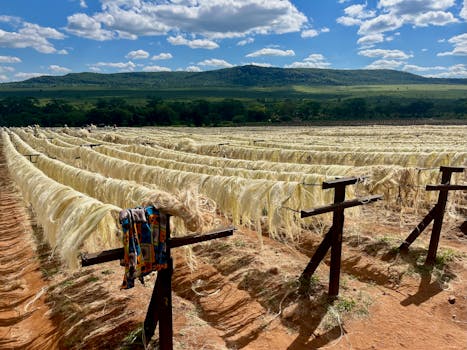Natural Fibers, Global Markets: Africa’s Role in the Sustainable Textile Revolution

Natural Fibers, Global Markets: Africa’s Role in the Sustainable Textile Revolution
Natural Fibers, Global Markets: Africa’s Role in the Sustainable Textile Revolution. The world is shifting towards a more sustainable future, and the textile industry is no exception. The demand for natural fibers is on the rise, driven by consumer awareness and concern for the environment. Africa, with its rich biodiversity and vast agricultural land, is poised to play a significant role in this revolution.
The African continent is home to a wide range of natural fibers, including cotton, hemp, flax, and sisal. These fibers are not only sustainable but also offer a unique set of properties that make them ideal for textile production. Cotton, for example, is a popular natural fiber that is breathable, durable, and absorbent. Hemp, on the other hand, is a highly versatile fiber that is resistant to pests and requires less water to produce.
The Current State of the Textile Industry in Africa
The textile industry in Africa is a significant sector that provides employment and income for millions of people. However, the industry is also facing several challenges, including lack of investment, outdated technology, and limited access to markets. Despite these challenges, there are many opportunities for growth and development, particularly in the area of sustainable textiles.
Several African countries, including South Africa, Egypt, and Morocco, have made significant investments in the textile industry. These countries have implemented policies and programs to support the development of sustainable textiles, including the production of natural fibers. For example, South Africa has implemented a program to support the production of organic cotton, while Egypt has invested in the production of flax and hemp.
The Benefits of Natural Fibers
Natural fibers offer several benefits, including sustainability, durability, and comfort. They are also biodegradable, which reduces the amount of waste in landfills and oceans. In addition, natural fibers require less energy to produce than synthetic fibers, which reduces greenhouse gas emissions and contributes to a cleaner environment.
Natural fibers are also good for the skin, as they allow for breathability and moisture-wicking properties. This makes them ideal for clothing and textiles that are in close contact with the skin. Furthermore, natural fibers are resistant to wrinkles and shrinkage, which makes them easy to care for and maintain.
The Future of Sustainable Textiles in Africa
The future of sustainable textiles in Africa looks promising, driven by the increasing demand for natural fibers and the growing awareness of the importance of sustainability. Several African countries are investing in the production of sustainable textiles, including the development of new technologies and manufacturing processes.
In addition, there are many initiatives and programs aimed at supporting the development of sustainable textiles in Africa. For example, the African Cotton and Textile Industries Federation (ACTIF) is working to promote the development of sustainable textiles in Africa, while the International Trade Centre (ITC) is providing technical assistance and support to African textile producers.
The growth of the sustainable textile industry in Africa is also expected to create new job opportunities and stimulate economic growth. The industry is expected to attract investments and create new markets, which will contribute to the development of the continent.
Conclusion
In conclusion, Africa is poised to play a significant role in the sustainable textile revolution, driven by the increasing demand for natural fibers. The continent’s rich biodiversity and vast agricultural land make it an ideal location for the production of sustainable textiles. With the right investments, technologies, and initiatives, Africa can become a leader in the production of sustainable textiles, creating new job opportunities and stimulating economic growth.




